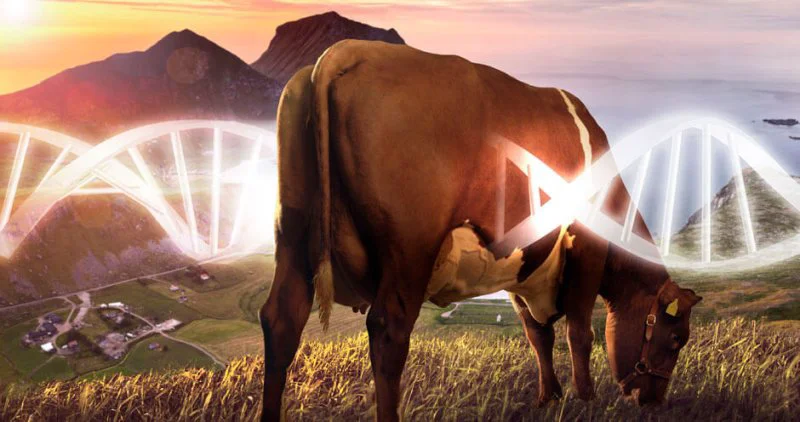2 in 5 dairy farmers believe cows should not be genetically engineered to reduce disease susceptibility. What might change their minds?
2 in 5 dairy farmers believe cows should not be genetically engineered to reduce disease susceptibility. What might change their minds?


[E]ven before the consumer sees a product on the grocery shelf… farmers’ decisions can make or break a technology’s chance of making it to stores.
Our recent study surveyed over 500 American dairy farmers on their willingness to adopt gene-edited genetics in their herds. We asked farmers about a Johne’s disease resistance application in particular and found, overall, that farmers weren’t ready or willing to adopt gene-edited genetics. This resistance was motivated by a variety of factors. In our sample, 42% of farmers believed that animals shouldn’t be genetically engineered or gene-edited, regardless of the application.
At the top of the list is a concern that consumers won’t accept dairy products from gene-edited cows, a top concern shared by 63.4% of farmers in our study. Other key concerns shared by about a third of farmers are a potential loss of market access for milk from gene-edited cows from wary consumers, a reduction in milk price, and the perception that gene-edited genetics are simply unnatural. For the companies hoping to get this technology on the market, these concerns represent the main hurdles that they’ll need to address to get the technology past the first gatekeepers of the market.
Read the original post

 | Videos | More... |

Video: Nuclear energy will destroy us? Global warming is an existential threat? Chemicals are massacring bees? Donate to the Green Industrial Complex!
 | Bees & Pollinators | More... |

GLP podcast: Science journalism is a mess. Here’s how to fix it

Mosquito massacre: Can we safely tackle malaria with a CRISPR gene drive?

Are we facing an ‘Insect Apocalypse’ caused by ‘intensive, industrial’ farming and agricultural chemicals? The media say yes; Science says ‘no’
 | Infographics | More... |

Infographic: Global regulatory and health research agencies on whether glyphosate causes cancer
 | GMO FAQs | More... |

Why is there controversy over GMO foods but not GMO drugs?

How are GMOs labeled around the world?

How does genetic engineering differ from conventional breeding?
 | GLP Profiles | More... |

Alex Jones: Right-wing conspiracy theorist stokes fear of GMOs, pesticides to sell ‘health supplements’




 Trust issues: What happens when therapists use ChatGPT?
Trust issues: What happens when therapists use ChatGPT? Fighting deforestation with CO2: Biotechnology breakthrough creates sustainable palm oil alternative for cosmetics
Fighting deforestation with CO2: Biotechnology breakthrough creates sustainable palm oil alternative for cosmetics Viewpoint — Fact checking MAHA mythmakers: How wellness influencers and RFK, Jr. undermine American science and health
Viewpoint — Fact checking MAHA mythmakers: How wellness influencers and RFK, Jr. undermine American science and health Viewpoint: Video — Big Solar is gobbling up productive agricultural land and hurting farmers yet providing little energy or sustainabilty gains
Viewpoint: Video — Big Solar is gobbling up productive agricultural land and hurting farmers yet providing little energy or sustainabilty gains California, Washington, Oregon forge immunization alliance to safeguard vaccine access against federal undermining
California, Washington, Oregon forge immunization alliance to safeguard vaccine access against federal undermining 30-year-old tomato line shows genetic resistance to devastating virus
30-year-old tomato line shows genetic resistance to devastating virus The free-range chicken dilemma: Better for birds, but with substantial costs
The free-range chicken dilemma: Better for birds, but with substantial costs ‘You have to treat the brain first’: Rethinking chronic pain with Sanjay Gupta
‘You have to treat the brain first’: Rethinking chronic pain with Sanjay Gupta
